You're looking for therapy games and activities to develop social skills in kids with autism, ADHD, or other developmental challenges. Together Land can be a valuable tool, leveraging classic games and tailored activities to promote cooperation, self-control, and emotional regulation. Customizable gameboards can be adapted to address specific therapeutic goals and needs, while group therapy games like SPOT IT, BLURT, and GO FISH can enhance social skills practice in a controlled environment. Anger management games like the Volcano Adventure Game and Mad Dragon Card Game can also teach emotional awareness and regulation.
Key Takeaways
- Together Land Therapy Game: Promotes social skills development through imaginative play, encouraging cooperation and emotional regulation.
- Play Therapy Cards: Develop social skills, emotional awareness, and empathy in kids with autism and ADHD through interactive games and activities.
- Group Therapy Games for Teens: Facilitate pro-social behaviors, self-control, and emotional regulation through structured games and exercises.
- Anger Management Toys: Help kids with autism and ADHD understand and manage emotions through interactive tools and games.
- Social Skills Activities for Kids: Enhance emotional awareness, empathy, and social interaction through structured activities and visual aids, addressing autism and ADHD needs.
Adaptation of Existing Games
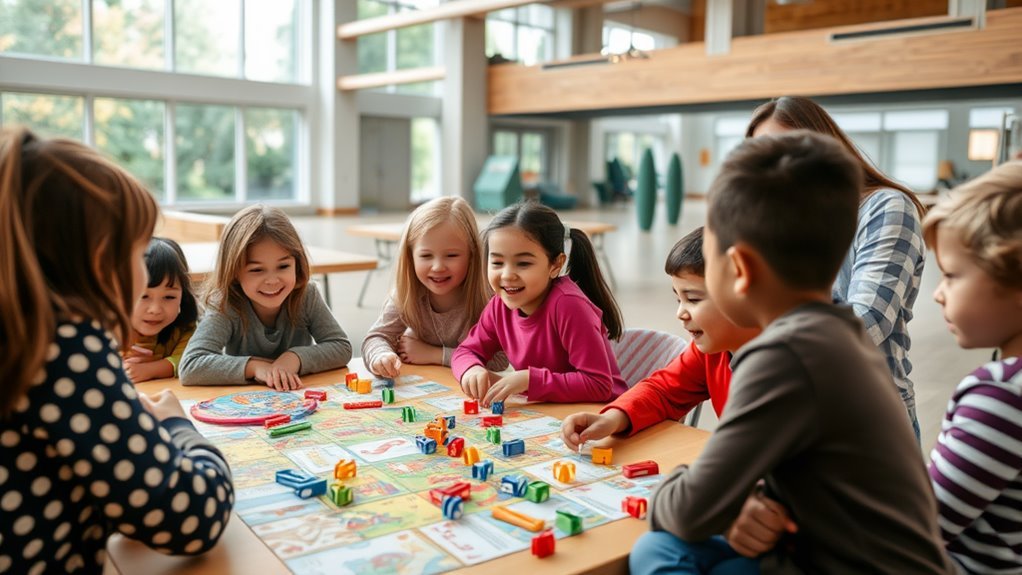
In adapting existing games for social skills development, a therapist can leverage the inherent mechanics and structures of classic games to craft a bespoke therapeutic experience tailored to the needs of children with social skill deficits. By selecting games that align with the child's interests and abilities, therapists can create a controlled environment for social skills practice. Social skills development can be enhanced through the adaptation of games that promote cooperation, self-control, and emotional regulation. For instance, "Roll the Ball" encourages taking turns and self-control, suitable for toddlers and older children. In this game, players take turns rolling a ball back and forth, promoting self-regulation and cooperation. Conversely, "Simon Says" enhances self-control, listening, and impulse control by following instructions. Emotion Charades teaches children to identify and act out different emotions, improving emotional recognition.
Customizable Gameboards for Therapy
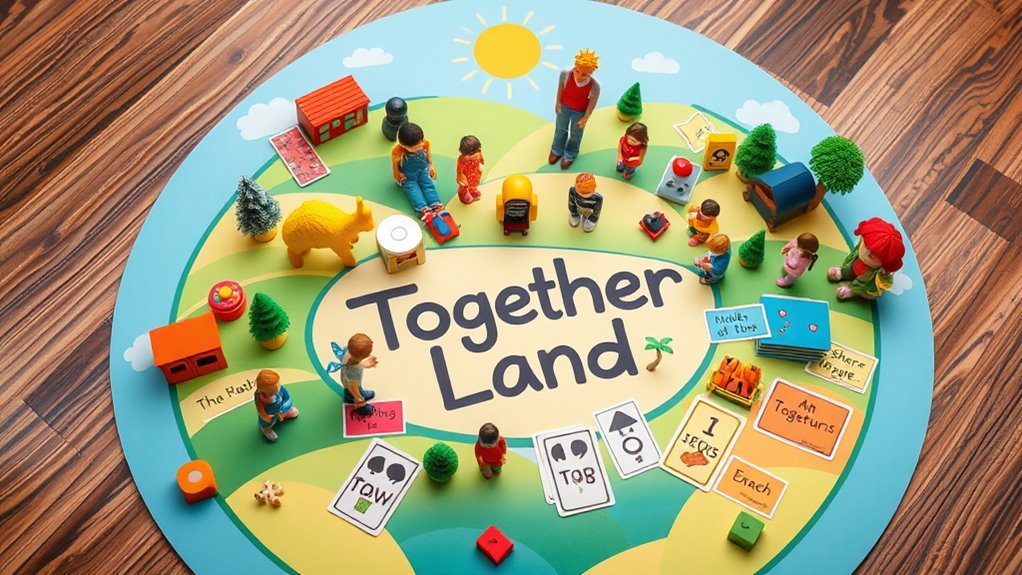
As you explore the possibilities of customizable gameboards for therapy, consider the diverse range of gameboard design options and customization options that can be tailored to address specific therapeutic goals and needs. KNOWLEDGE suggests that tabletop role-playing games (TTRPGs) can reduce general anxiety and social anxiety in participants, making them a useful tool for therapy and treatment programs.
You can leverage these customizable elements to create gameboards that integrate cognitive behavioral therapy elements, promote pro-social behaviors, and enhance emotional recognition and regulation. The study's findings highlight the need for further research on the therapeutic benefits of TTRPGs, and future gameboard designs should consider incorporating more data-driven approaches to improve treatment outcomes.
Gameboard Design Options
SUBTOPIC 1: LANGUAGE DEVELOPMENT
- Following Directions & Describing: Students can practice following simple multi-step directions and describing objects, colors, and categories.
- Colors: Games can target color identification, naming, and categorization.
- Categories + Colors: Students can identify colors and match them to categories, such as animals, fruit, or things that move.
- Describing: Students can describe their location on the game board, objects, and actions.
- WH-Questions: Games can include asking WH-questions, such as "Who is winning now?" or "Where did you move to?"
- Articulation games can be used to improve speech and language skills.
- Vocabulary games can be used to target specific language skills, such as vocabulary and comprehension.
- Memory games can be used to improve cognitive skills and memory.
SUBTOPIC 2: SOCIAL SKILLS
- Turn Taking: Games can teach turn-taking, taking turns, and waiting for one's turn.
- Winning & Losing: Students can learn about winning and losing, good sportsmanship, and coping with emotions.
- Conversational Skills: Games can encourage conversation, active listening, and maintaining a conversation.
- Emotional Regulation: Students can learn to regulate their emotions, such as excitement, disappointment, or frustration.
- Empathy: Games can promote empathy, understanding, and compassion towards others.
SUBTOPIC 3: GUESS WHO?
- Expressive Language: The game can target expressive language skills, such as formulating wh-questions and answering yes or no questions.
- Receptive Language: Games can improve receptive language skills, such as understanding questions and following directions.
- Deductive Reasoning: Students can practice deductive reasoning and critical thinking to guess a conclusion or create a guess based on evidence.
- Analytical Thinking: Games can promote analytical thinking, such as evaluating clues and making educated guesses.
- Problem-Solving: Students can learn to solve problems and make decisions based on the information provided.
SUBTOPIC 4: NEDS HEAD?
- Articulation: Games can target articulation skills, such as replacing sounds with correct articulations.
- Deductive Reasoning: Students can practice deductive reasoning to guess what object is being touched or held.
- Categories: Games can promote categorization, such as identifying objects as animals, fruit, or other categories.
- Vocabulary: Students can learn new vocabulary related to the game and its themes.
- Describing: Games can encourage descriptive language, such as describing objects, textures, and actions.
SUBTOPIC 5: CANDYLAND
- Articulation: Games can target articulation skills, such as replacing sounds with correct articulations.
- Following Directions: Students can practice following directions and taking turns.
- Conversational Skills: Games can encourage conversation, active listening, and maintaining a conversation.
- Describing: Students can describe their location on the game board, objects, and actions.
- Problem-Solving: Games can promote problem-solving, such as navigating through the game board and making decisions.
SUBTOPIC 6: HEADBANZ
- Headbanz is a speech therapy board game similar to Guess Who.
- The game has more questions and options for the correct answer.
- The game is suitable for older kids and can be adapted to different age groups.
- Headbanz can be used to target specific language skills, such as wh-questions and deductive reasoning.
- The game has different versions, including a Disney-themed one and a blast-off version.
SUBTOPIC 7: JENGA
- Jenga is a game that can be used to target specific language skills.
- The game can be adapted to different age groups and skill levels.
- The game can be used to improve articulation skills and vocabulary.
- The game can be used to target specific language goals, such as following simple directions and sequencing.
- The game can be used to improve cognitive skills and memory.
SUBTOPIC 8: PICKLES TO PENGUINS
- Pickles to Penguins is a card game that can be used to target specific language skills.
- The game has a large number of vocabulary words, with over 1,000 different words.
- The game can be used to target specific language goals, such as vocabulary and comprehension.
- The game can be used to improve language skills and sequencing.
- The game can be used to target specific language goals, such as following simple directions and sequencing.
SUBTOPIC 9: SPOT IT
- Simple gameplay involves flipping over two cards with multiple object pictures to spot identical objects.
- Game is great for fast-paced practice opportunities in one session.
- Use a premade deck of Spot It cards with articulation sound already included.
- For articulation practice, have students say the matched word or put it in a sentence.
- For language skills practice, identify categories, compare and contrast, colors, and size.
SUBTOPIC 10: BLURT
- Perfect for working on vocabulary skills.
- One player reads the definition or clue, and other students race to blurt out the correct word.
- Have students identify the correct vocabulary word given a definition or clue.
- Using clues and information, make inferences about the correct vocabulary word.
- Great for working on listening comprehension and word retrieval.
SUBTOPIC 11: GO FISH
- Quick and easy to set up.
- Most kids already know how to play.
- For articulation practice, have students practice their target word 1-3x per turn.
- Use a premade deck of Go Fish cards with articulation sound already included.
- Practice requesting from others
Together Land Therapy Game for Kids Play Therapy Cards Develop Social Skills Group Therapy Games for Teens Anger Management Toys Counselors Social Skills Activities for Kids With Autism and ADHD
Gameboard Design Options (Customizable Gameboards for Therapy)
Clarifying the design elements and interactive mechanics of
Customization for Therapy
Designing a gameboard for therapy requires a thoughtful approach to customization, as each child's needs and abilities are unique. To tailor the game to individual requirements, consider the following factors:
| Adaptability for Neurodivergent Learners | Modifying Game Rules | Visual Supports |
|---|---|---|
| Simplify complex skills into manageable components | Break down complex directions into simpler steps | Incorporate choice boards with laminated pictures and velcro strips |
| Use visual aids to support learning | Modify game rules to accommodate different skill levels | Utilize visual supports to enhance engagement |
| Choose games that cater to various learning styles | Adapt game length to match attention span and engagement | Incorporate visual reminders to support memory |
Customization is key to ensuring the game is effective and enjoyable for each child. By adapting the game to meet individual needs, you can enhance the therapeutic benefits and promote learning. Consider the child's strengths, weaknesses, and learning style when making adjustments. This will help ensure the game is engaging and effective, promoting social skills, emotional regulation, and cognitive development. Adaptability for Neurodivergent Learners is crucial for creating an inclusive and supportive environment.
| Adaptability for Neurodivergent Learners | Modifying Game Rules | Visual Supports |
|---|---|---|
| Simplify complex skills into manageable components | Break down complex directions into simpler steps | Incorporate choice boards with laminated pictures and velcro strips |
| Use visual aids to support learning | Modify game rules to accommodate different skill levels | Utilize visual supports to enhance engagement |
| Choose games that cater to various learning styles | Adapt game length to match attention span and engagement | Incorporate visual reminders to support memory |
Customization is key to ensuring the game is effective and enjoyable for each child. By adapting the game to meet individual needs, you can enhance the therapeutic benefits and promote learning. Consider the child's strengths, weaknesses, and learning style when making adjustments. This will help ensure the game is engaging and effective, promoting social skills, emotional regulation, and cognitive development.
Printable Resources Available
Utilizing printable resources is a strategic approach to implementing therapy games, as it allows clinicians and educators to adapt games to meet the unique needs of each child. By leveraging these resources, you can tailor therapy sessions to address specific emotional regulation and social skills challenges.
Available in PDF format for instant download, making it easy to access and integrate into your practice.
Includes a variety of games designed for emotional regulation, social skills, and coping mechanisms, such as "How Would You Feel?", "The Anger Meter", and "Feelings Flash Cards".
Suitable for in-person and telehealth sessions, allowing for flexibility and convenience.
Can be printed on card stock and laminated for prolonged use, ensuring durability and longevity.
When utilizing printable resources, you can facilitate emotional development and social skills in children, promoting healthy connections and empathy. By adapting these resources to meet the needs of each child, you can create a personalized and effective therapy experience.
Therapeutic Questions and Prompts
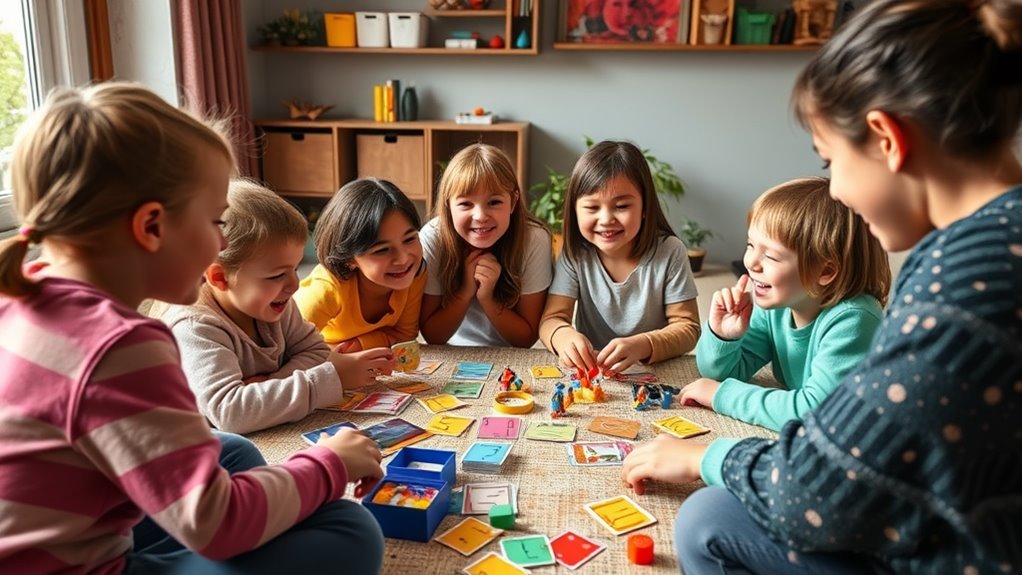
As you design therapeutic questions and prompts for the Together Land Therapy Game for Kids, consider how these tools can facilitate emotional growth by encouraging children to explore and express their feelings, thoughts, and behaviors in a safe and supportive environment. By using a range of questions and prompts, you can help children develop emotional awareness, regulation, and expression, ultimately promoting positive behavioral outcomes. Effective therapeutic questions and prompts should be tailored to the individual child's needs and abilities, allowing for a personalized and engaging therapeutic experience. Emotional Intelligence plays a crucial role in this process, as it enables therapists to gather information from interactions to offer solutions.
Therapeutic Questions and Prompts
When exploring therapeutic questions and prompts, it's essential to begin by examining the realm of self-awareness, where individuals can gain insight into their thoughts, feelings, and behaviors. This process involves reflecting on personal experiences, emotions, and interactions with others.
Therapeutic questions for self-awareness can help individuals develop a deeper understanding of themselves, including their strengths, weaknesses, values, and goals. For example, you can ask yourself:
- Describe a time when you felt proud of yourself and why.
- What're three things you appreciate about yourself?
- Reflect on a recent challenge you faced and how you overcame it.
- Write about a time where you judged someone based on their physical appearance. What happened?.
- Write about a time where you made an assumption about someone's identity and you were wrong. What happened? How did you handle it?
Therapeutic questions for social awareness, relationship skills, and responsible decision-making can also be used to foster personal growth and development. These questions can help individuals develop empathy, communication skills, and critical thinking. For instance:
- How can I use my privilege to help others?
- What're some conditions that help you feel safe or brave talking about important topics?
- List three things you want in your school/community. List three things you want out of your school/community.
- What makes someone a good friend?
- Is your school a safe and inclusive space for everyone? How can you help make it a safe and inclusive space?
Facilitating Emotional Growth
Facilitating emotional growth in children requires a comprehensive approach that incorporates various strategies and techniques. As a professional working with children, you can facilitate emotional growth by modeling emotional control. Demonstrate how to manage emotions, such as taking deep breaths when frustrated, and encourage children to do the same.
Consistent warmth and affection are also crucial in developing secure relationships and positive interactions with peers. Use nonverbal cues like nodding or gentle touching to guide behavior, and provide positive self-talk and self-reflection opportunities.
To further enhance emotional growth, engage children in interactive activities like attunement activities, music and songs, board games, and partner and group activities. These activities help develop social-emotional skills, such as persistence and emotional regulation.
Create a classroom environment that fosters a culture of kindness and supportiveness, and practice active listening to understand and validate children's emotions. Establish "little rules" framed in positive terms to focus on desirable behaviors, and incorporate daily greetings to foster a positive and welcoming environment.
Breathing Strategies for Emotional Regulation
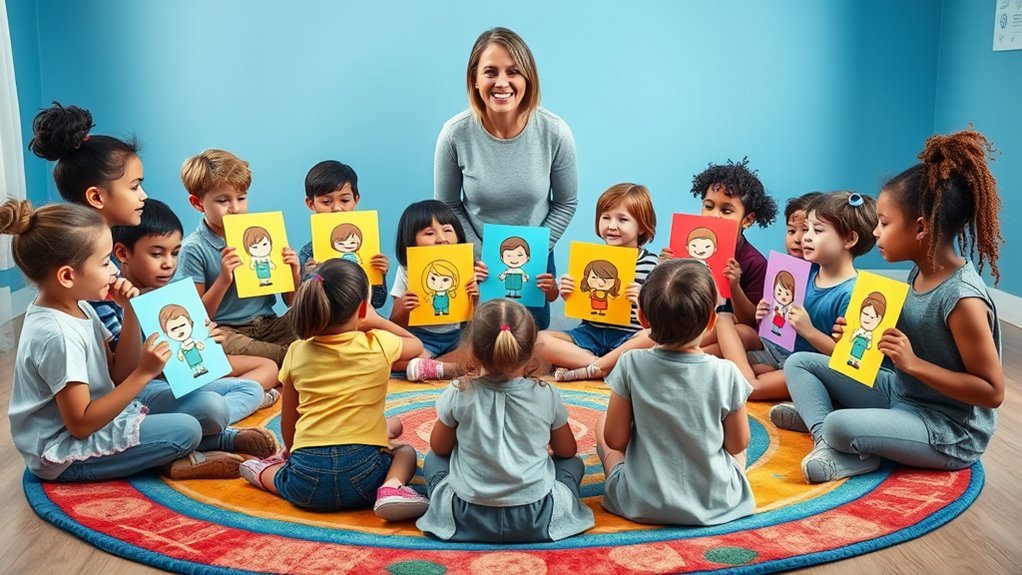
Breathing Strategies for Emotional Regulation
Breathing strategies serve as a crucial component in promoting emotional regulation in children, which is essential for their overall well-being and quality of life. By incorporating breathing techniques into daily routines, children can learn to manage their emotions and develop better coping mechanisms. Breathing techniques can be tailored to individual needs and preferences.
To enhance emotional regulation, you can try the following breathing strategies:
- Diaphragmatic Breathing: Focus on expanding the abdomen during inhalation and contracting it during exhalation to engage the diaphragm.
- Belly Breathing: Similar to diaphragmatic breathing, involves placing hands on the stomach to feel the expansion and contraction.
- Square Breathing (Box Breathing): Inhale, hold, exhale, and hold again for equal counts, typically four seconds each.
- Meditative Breathing: Combine breathing with meditation by counting or using relaxing thoughts during inhalation and exhalation.
Breathwork can be done in the comfort of your own home while sitting or lying down with eyes closed. This type of practice has been used for centuries in many different cultures to help people cope with stress, improve mental health, and gain greater control over their emotional states.
Video Support for Therapy Sessions
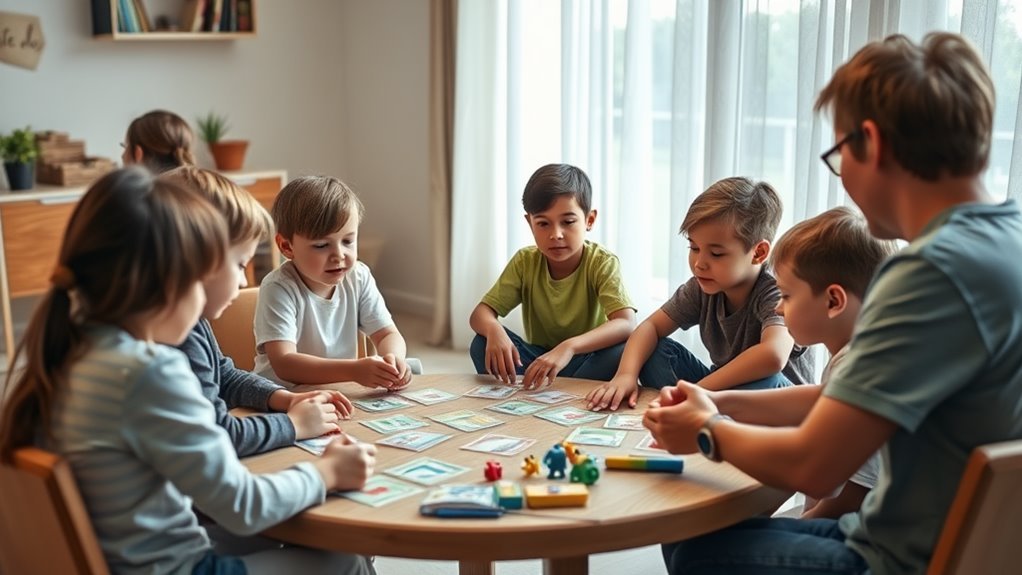
As you consider the integration of video support into your therapy sessions, you'll want to explore how technology can assist therapists in delivering effective sessions, enhance client engagement, and ultimately improve treatment outcomes.
You can examine the various tools and techniques available to support therapy sessions online, such as session assistance, virtual waiting rooms, and secure video conferencing platforms.
Therapy Session Assistance Available
Therapy sessions rely heavily on accurate observation, documentation, and analysis to inform treatment decisions and drive progress. As a therapist, you can leverage video support to enhance your sessions and improve outcomes. With video recording and review capabilities, you can capture high-definition footage of your sessions, complete with synchronized audio, to analyze and refine your techniques.
To get the most out of video support, consider the following features:
- Pause, rewind, and annotate specific moments in recordings for targeted feedback.
- Multi-camera support to capture various angles and dynamics of therapy sessions.
- Secure sharing features enable collaboration and peer feedback among students.
Supporting Therapy Sessions Online
With the integration of video support into your therapy sessions, you can now leverage the benefits of remote observation and collaboration to enhance the effectiveness of your practice. To set up an online therapy session, ensure a strong, stable internet connection and keep your computer or device and all relevant apps updated to prevent technical issues.
Test your camera, microphone, and speakers before the session to ensure they're functioning correctly.
To create an online therapy environment, ensure a quiet, well-lit space free from distractions and communicate with your clients to ensure they're in an undisturbed and comfortable space during sessions. Use headphones to enhance audio quality and block out external distractions. Keep the session full screen and turn on "Do Not Disturb" mode to maintain focus.
During the session, silence your phone and disable notifications on your computer to avoid interruptions. Use secure and compliant platforms that meet data privacy regulations like HIPAA or GDPR. Encourage clients to take notes during sessions to remember key discussions and provide feedback on what's working well and what isn't. By implementing these strategies, you can ensure a smooth and effective online therapy session setup.
Enhancing Therapy Outcomes Techniques
Implementing outcome measures is a crucial step in enhancing therapy outcomes techniques, particularly when utilizing video support for therapy sessions. To effectively utilize video support, it's essential to select outcome measures that are relevant to the client's presenting issues, consider ease of administration and scoring, and ensure reliability and validity.
Administer measures at intake and termination, and use regular intervals (e.g., every 4-6 sessions) to track progress.
Selecting measures should be based on the client's specific needs and goals.
Allocate time at the beginning or end of sessions for completion, and consider using digital tools for remote completion between sessions.
Utilize online platforms and mobile apps for remote data collection, and implement automated scoring to reduce errors and save time.
Progress feedback is a critical component of enhancing therapy outcomes techniques. By providing regular progress feedback, clinicians can identify cases that need adjustment, focus attention, and provide new information. This can lead to stronger treatment outcomes, especially for common mental health problems.
Provide feedback regularly, such as session-by-session.
Use standardized measures for consistency.
Tailor feedback systems to the specific client population.
Address methodological and implementation challenges in feedback systems.
Rapport Building With Play Therapy
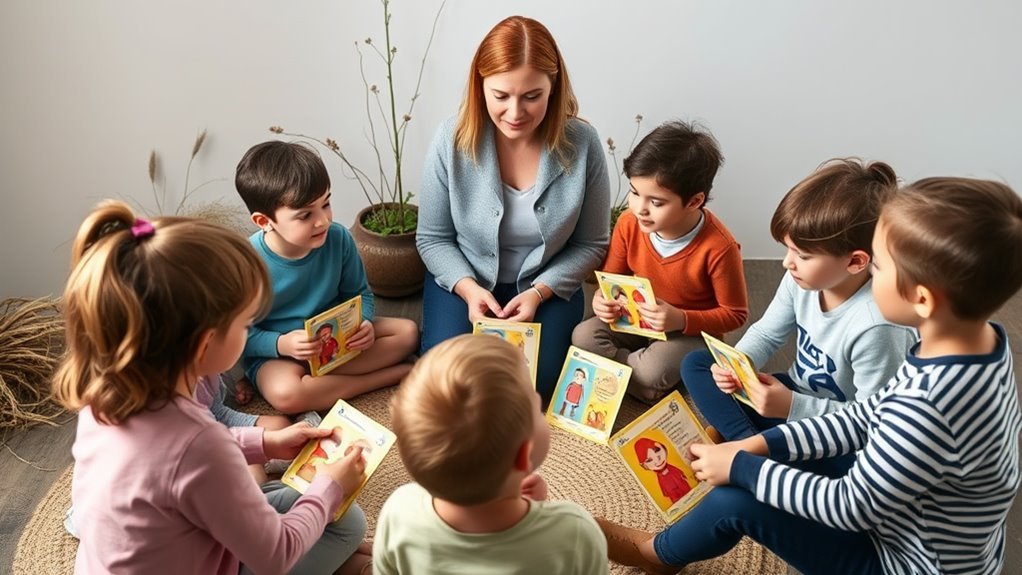
Establishing a strong rapport with children is fundamental to the success of play therapy, as it fosters a trusting relationship that enables children to feel happy, relaxed, and engaged in the therapeutic process.
To build rapport with children, you must focus on creating a connection without giving instructions initially. Play is the primary method for building rapport, especially when aligned with the child's interests.
You can use various techniques to build rapport, such as commenting on the child's play behaviors, praising them for displaying appropriate play behaviors, imitating their actions and vocalizations, reflecting their vocalizations and actions, and initiating play with tangible items they enjoy. Activities like sensory play, board games, drawing and coloring, toy vehicles, and child-led play can also help build rapport.
To maintain and enhance rapport, you must create a safe, non-threatening environment in the play therapy room. Use child-centered play therapy to encourage autonomy and decision-making, and return responsibility to the child. Be mindful of factors like age, developmental age, and emotional state that impact rapport building. By incorporating these strategies, you can establish a strong rapport with children and create a trusting relationship that enables them to feel happy, relaxed, and engaged in the therapeutic process. This, in turn, will enhance the effectiveness of play therapy.
IEP and Behavioral Goal Alignment
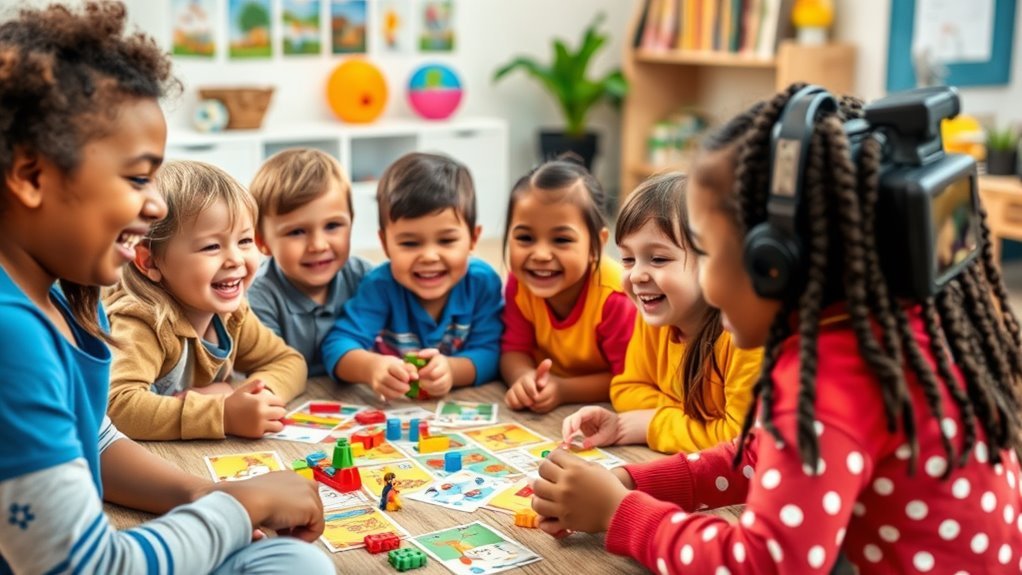
- Clear and measurable objectives that focus on teaching and building prosocial and positively stated replacement behaviors
- Criteria for success that include metrics and timelines to track progress
- Alignment with the student's current level of functioning and individual needs
- Focus on teaching and building prosocial and positively stated replacement behaviors clarify goals through behavioral assessments
- The implementation of these goals should be grounded in a thorough behavioral assessment and the development of a comprehensive intervention plan.
Group Therapy Games for Teens
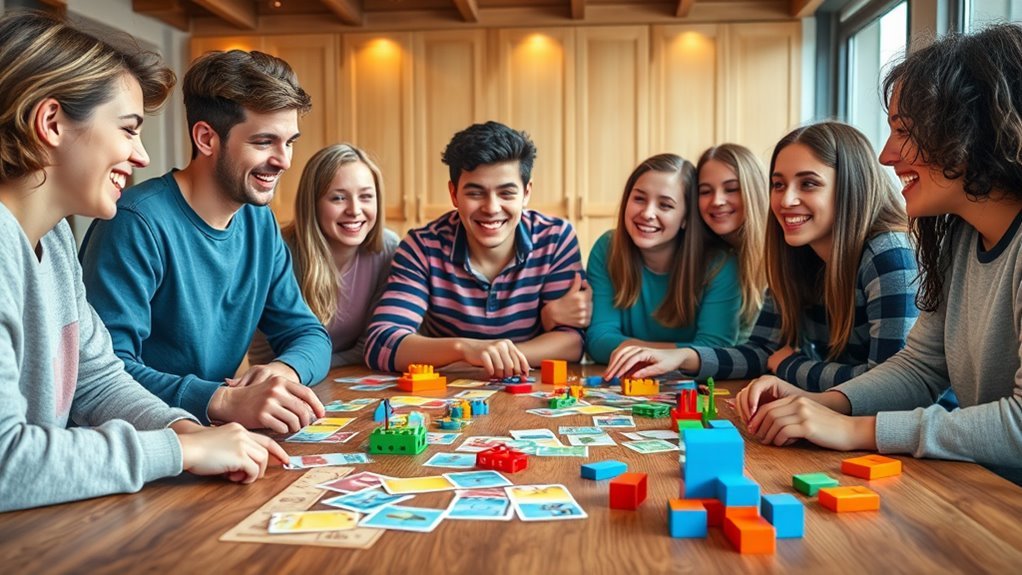
Group therapy games offer a unique and engaging approach to building trust, fostering emotional awareness, and promoting creativity and collaboration among teenagers. As a facilitator, you can use these games to create a safe and supportive environment for teens to explore their emotions, develop social skills, and enhance their overall well-being.
To build trust and open conversation, try Two Truths and a Lie or The Name Game, which encourage participants to share personal experiences and thoughts.
For emotional awareness and expression, use Feelings Jenga or The Self-Compassion Pause, which help teens explore and understand their emotions.
To enhance creativity and collaboration, employ Collaborative Drawing or Lego-Building Communication Activity, which promote teamwork and problem-solving skills.
Anger Management Games for Kids
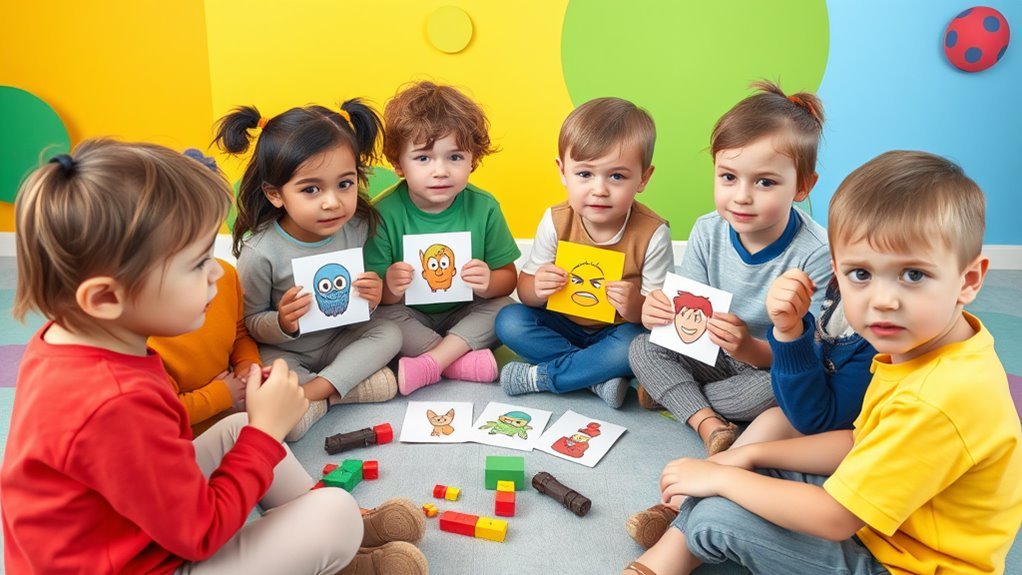
When managing anger, it's crucial for kids to learn healthy coping strategies to prevent explosive outbursts and develop self-regulation skills. Effective anger management is a vital life skill that can benefit kids in all aspects of life.
To achieve this, you can utilize various interactive games and activities that promote emotional awareness, regulation, and expression.
Some effective anger management games for kids include:
- Volcano Adventure Game: Combines crafting and gameplay to explore underlying emotions leading to anger.
- Fishing for Feelings Game: Helps kids think about times they felt multiple emotions at once.
- Mad Dragon Card Game: Teaches anger control by helping kids identify and avoid anger-provoking situations.
- Anger Management Bingo: Involves creating bingo cards with coping strategies or triggers.
These games and activities can be used to teach kids various emotional regulation techniques, such as breathing exercises, role-playing, and creative expression. By incorporating these strategies into their daily lives, kids can develop better self-regulation skills, leading to improved emotional well-being and relationships.
Social Skills Activities for Autism
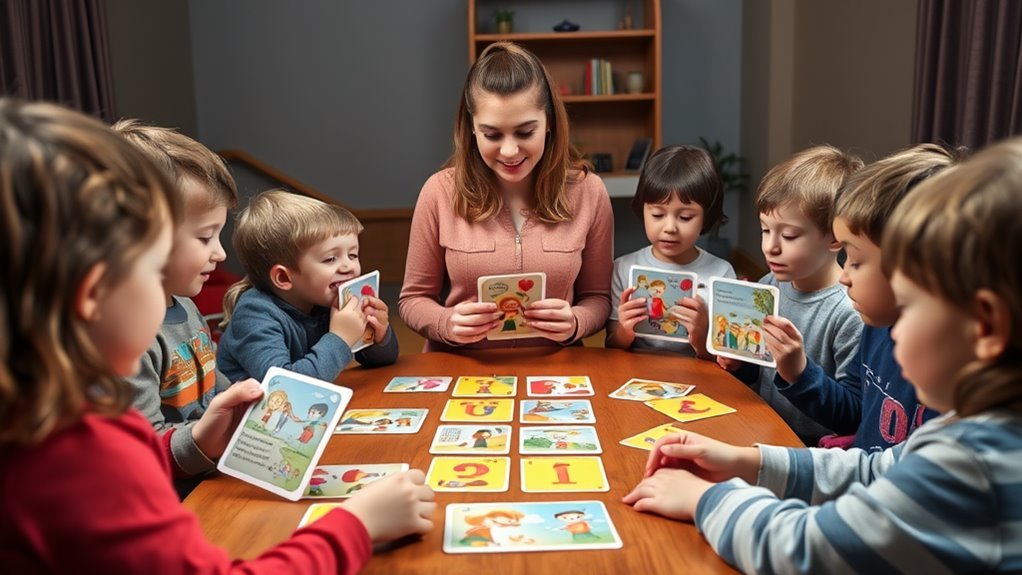
Developing social skills is a fundamental aspect of improving the quality of life for individuals with autism, enabling them to navigate complex social interactions and build meaningful relationships with their peers and family members. As a parent, caregiver, or therapist, you play a crucial role in helping individuals with autism develop these essential skills.
To begin, you can use social communication activities to help individuals with autism understand and express emotions more effectively. This can be achieved through activities such as role-playing different social scenarios, using picture cards to depict various emotions, and practicing storytelling with an emphasis on emotions. Additionally, using visual aids like social stories or cue cards can help clarify social expectations and sequences of interaction.
You can also engage individuals with autism in social interaction activities, such as playing with peers, organizing group outings, and incorporating board games that build upon the concept of sharing and add social rules. By incorporating emotional regulation tools and games, you can help individuals with autism understand and manage their emotions, as well as develop empathy and perspective-taking skills. By following these structured and fun activities, you can help individuals with autism develop the social skills they need to thrive.
Developing social skills is a [key aspect of improving the quality of life for individuals with autism.
Conclusion
You are now seated in a serene playroom, surrounded by therapy cards and game boards, as children play together, developing social skills and emotional regulation. Their faces light up with joy and understanding as they navigate group therapy games and activities. With each successful interaction, their confidence grows, and their paths to healing and self-discovery become more defined. Therapy sessions become a catalyst for growth, fostering resilience and harmony within individuals and communities.
